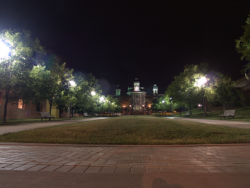
The American university is in distress. Enrollment is declining, tenure is disappearing, administrative costs are ballooning, and public trust in academia is eroding. More concerning, however, is the deeper structural crisis that has transformed universities from bastions of knowledge into battlegrounds of ideological warfare and administrative overreach. At the heart of this crisis lies a […]
Read More
Suppose I were to tell you that in a North Carolina county, neighborhoods with a “lower percentage of White individuals … lower economic and racial spatial advantage, and higher area deprivation” and “higher reported violent crimes, evictions, poverty, unemployment, uninsurance, and child care center density, as well as lower election participation, income, and education,” are […]
Read More
A revealing article in the February 2022 issue of Frontiers in Communications provides tremendous insight into the roadmap that Critical Theory advocates are using to conquer STEM, the last academic sector still holding out against the long march through the institutions. Titled “Acknowledging and Supplanting White Supremacy Culture in Science Communication and STEM: The Role […]
Read More
Open Access The University of California signed an open-access agreement with the publisher Springer Nature this past week. That’s an improvement on the status quo—although it’s not yet clear how much of an upgrade it will prove to be. The new agreement responds to a dysfunctional status quo in the world of academic publishing. Academic […]
Read More
In two recent articles (Asia Times and PJ Media), David Goldman criticized the Trump administration’s trade policy with China, in particular, the notion that tariffs will help U.S. competitiveness. Instead, he points to a lack of U.S. innovation. In the PJ Media article, Goldman concludes with five recommendations, the first four being: As we did […]
Read More
In the first couple weeks of any survey course in the principles of economics, students are taught that prices are determined by the interactions of consumers (demand) and producers (supply). Prices for many things, such as oil, or of common stocks, constantly change with the frequent shifts in the willingness of consumers and producers to […]
Read More
American history has been radically transformed on our campuses. Traditional topics are now not only marginalized but “re-visioned” to become more compatible with the dominant race/class/gender paradigm. In two posts last fall, I took a look at U.S. history offerings at Bowdoin College. The liberal arts college, one of the nation’s finest, long enjoyed a reputation as a training […]
Read More
The ongoing controversy over University of Texas sociologist Mark Regnerus is a textbook example of how a legitimate scholarly dispute can turn into a political witch-hunt. Regnerus, an associate professor of sociology at Texas’s flagship campus in Austin, published a peer-reviewed paper in June in the journal Social Science Research concluding that the adult children […]
Read More
Based on “new findings involving behavioral genetics,” reports the Chronicle of Higher Education, a growing clump of contemporary social scientists agrees with Gilbert and Sullivan that both liberals and conservatives (but especially conservatives) are the product of nature, although they seem to find nature’s […]
Read More
For insight into the corruption of the modern academy, look no further than Heather MacDonald’s extraordinary article on the recent controversy at Duke. Two Duke professors, Peter Arcidiacono and Ken Spenner, and a graduate student, Esteban Aucejo, produced a paper showing that African-American students at Duke disproportionately migrate from science and engineering majors to less […]
Read More
Cross-posted from National Association of Scholars. Climategate, both 1 and 2, are textbook cases of gross lapses in professional ethics and scientific malfeasance. To understand why, one must first understand what science is and how it is supposed to operate. Science is the noble pursuit of knowledge through observation, testing and experimentation. Scientists attempt to […]
Read More
The Harvard Faculty of Arts and Sciences (FAS) has done it again. This is the group that effectively drove former Harvard president Lawrence Summers out of office over a 2005 remark of his about possible differences between the sexes that didn’t sit well with hard-line feminists on the Harvard faculty. The FAS voted its “lack […]
Read More
The New York Times proclaimed recently that science educators and others are vitally concerned that high dropout rates of students studying math, science, and engineering (the “STEM” disciplines) will imperil our nation’s technological leadership. There is a shortage of people in these fields, it is argued, and efforts to increase numbers are thwarted by dropout rates […]
Read More
Writing here over a year ago in The Misguided Push for STEM Diversity, I noted that “Sometimes it seems as though the most heavily researched, richly funded area of American science today involves studies of why there aren’t more women in STEM fields (Science, Technology, Engineering and Math) and efforts to induce, recruit, and retain […]
Read More
Another day, another bunch of dollars thrown at studies lamenting “the gender gap in science and technology fields.” The most recent comes from the U.S. Dept. of Commerce, Women in STEM: A Gender Gap to Innovation. From its Executive Summary: Our science, technology, engineering and math (STEM) workforce is crucial to America’s innovative capacity and […]
Read More
Two noteworthy overseas higher-ed items recently crossed my desk. The first came from Britain, where the coalition government has decided to rework the nation’s science instructional standards. Among the proposed changes: eliminating the requirement that science classes “challenge injustice.” Education Secretary Michael Gove argued that such “irrelevant material” contributes “nothing to helping students deepen their stock of knowledge.” While it’s […]
Read More
Inside Higher Ed reports that a workshop at the University of Washington is attempting to reduce the number of women who work in STEM fields in industry. Neither the IHE article nor the organizers of the workshop put it quite that way, of course, but that nevertheless is clearly the workshop’s purpose. “The organizers of the On-Ramps […]
Read More
The latest MIT report on the status of its faculty women– earlier ones appeared in 1999 and 2002–finds impressive progress and “an overwhelmingly positive view of MIT,” but the key word in the seemingly endless stream of reports on women in STEM fields, “marginalization,” inevitably pops up as well, this time in reaction to “the […]
Read More
Are you a female STEM student (or wannabe STEM student) suffering from a stereotype infection? Then, according to new research recently described in Inside Higher Ed (“Inoculation Against Stereotype”), you should take a course from a female instructor to inoculate yourself. The research, based on a study at U Mass Amherst by Nilanjana Dasgupta, associate professor of […]
Read More
As noted in my December 1 essay here, Rigoberta’s Revenge, the American Anthropological Association stuck a stick in a hornet’s nest with its recent decision to remove the word “science” from its long range planning document. Stung by the resulting swarm of criticism, the AAA’s four officer’s have now issued a statement claiming the entire […]
Read More
Freshmen in the University of California Berkeley’s College of Letters and Science will be asked to take part in a novel program designed, it is said, to stimulate discussion of personalized medicine. That kind of medicine–hailed by many in health care as potentially revolutionary–focuses on genetic screening to determine an individual’s susceptibility to various diseases […]
Read More
——————————————- This piece appeared originally in the June 2010 issue of Liberty ——————————————— Women can’t get any satisfaction these days. Yet another report, this by the American Association of University Women (AAUW), asks why there are so few women in the STEM professions. (For those outside the education community, this acronym refers to the prestigious […]
Read More
A few weeks ago I discussed The Misguided Push for STEM Diversity, noting that every month or so (or so it seems) a new report appears pointing with alarm to the “underrepresentation” of women or blacks or Hispanics or Aleuts (or usually all of the above) in the STEM fields of science, technology, engineering, math […]
Read More
According to a short news item in Inside Higher Ed today, “The American Association for the Advancement of Science and the Association of American Universities have issued a new handbook with detailed legal resources to help colleges recruit and retain faculty members and students in science fields. The handbook notes legal challenges to some forms […]
Read More
If only Carole Carrier and her peers felt more aggrieved, the new report released by the American Association of University Women on women in science would make more sense. On the day the AAUW report was released, Carrier, a 34 year-old mechanical engineer who works part-time, was walking down the street in early spring with […]
Read More
Sometimes it seems as though the most heavily researched, richly funded area of American science today involves studies of why there aren’t more women in STEM fields (Science, Technology, Engineering and Math) and efforts to induce, recruit, and retain more of them. In her article for Minding the Campus, Susan Pinker deftly punctures the omissions […]
Read More
The headline in the East Bay Express a few weeks back probably didn’t surprise people in California, bracing as they have been for funding shortfalls in government services, including education: “Berkeley High May Cut Out Science Labs”. The first few words of the story delivered the distressing news that the School Governance Council had decided […]
Read More
Should universities weigh race and ethnicity in deciding whom to hire for their science departments? The American Association for the Advancement of Science thinks so, according to a recent National Journal article. “Science and engineering should look like the rest of the population,” says AAAS’s Daryl Chubin, and if hiring decisions don’t yield the right […]
Read More
Spend some time among humanities researchers and it won’t be long before you hear complaints about lack of support. They grumble that while the sciences have countless sources and billions of dollars pouring into their labs and clinics and field work, the humanities have NEH, a smattering of foundations giving fellowships, a handful of humanities […]
Read More
Almost all of the best-paying undergrad degrees by salary are in engineering, the Huffington Post points out in a gloss on the PayScale rankings of degrees by average salary.
Read More